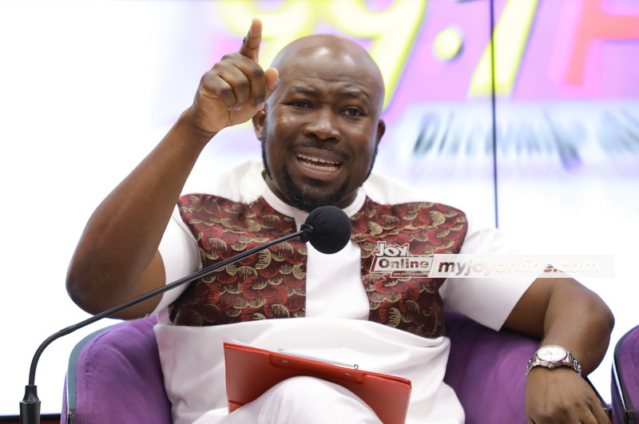Convenor of the Ghana Individual Bondholders Forum, Senyo Hosi, has rebuffed claims that the rejection of the domestic debt exchange programme by individual bondholders would bring untold economic hardship to the country and would potentially make their bonds worthless.
According to him, data available from the Finance Ministry demonstrates that such claims are false and merely meant to create a state of fear and panic to get bondholders to sign unto the ongoing debt exchange programme.
Speaking on JoyNews’ PM Express, he explained that signing onto the debt exchange programme would rather make ones bonds potentially worthless and irredeemable.
“Please anybody who tells you [that] is a liar, is uneducated, has no skills, is not worth any attention if you’re an individual bondholder. 1+1 can’t be 3. It can’t be one and half. It’s not Senyo, this one is just math, it’s science, it’s finance, it’s economics and again it’s common sense,” he retorted.
His comments follow a solemn plea from NPP stalwart, Gabby Otchere-Darko on Sunday who said that even though the terms of the debt exchange programme will affect individual bondholders, it is a necessary step which must be taken to salvage the economy.
“Ghana is in a very difficult place. What we are seeing with the mobilisation of agitation on individual bondholders poses a real and serious risk worse than what we witnessed when opposition to E-Levy succeeded in derailing an already shaky macroeconomic situation from 2021,” his tweet read.
“If the no-compromise opposition to it wins, what then has been achieved? It may lead to national debt default.
“So what then happens to the value of your bonds after! Potentially worthless. If participation is low, we jeopardize resolving the economic crisis and hardships,” he added.
However, explaining the risk of signing onto the government’s new bonds under the debt exchange programme, Senyo Hosi noted that bondholders were much safer holding on to their current bonds rather than discarding them for the new ones.
He said, “with bonds right now your investment is retained because that’s your expectation. You went in for 16%, you’re getting your 16%, no problem. Secondly if you take an ESLA or you take a Daakye bond, the source of the revenue is secured.
“The ESLA is even governed by British law, English law; it’s not even governed by Ghana law. Anytime you buy petrol, the money to pay your ESLA flows in. You’re already taxed to pay off the bond.”
He further explained that while bondholders who are yet to sign discard their old bonds for the new bonds have the right to sue government and receive reparations from the state should the government default on payment, under the debt exchange programme, the government is granted immunity.
So while you can sue government, it will merely be considered an academic exercise as no reparations will be received.
“Then you have in these current bonds GoG, Government of Ghana has no immunity. So your rights are fully enforceable. If government refuses to pay, you can sue them and suing them is not just enough because it can also be an academic exercise. What’s most important is its enforceability where you can actually now attach an asset. You can execute your judgement.
“Under you current bond framework you can do that, under the new one you can’t do that. You can sue them but they’re making you waive your right and granting them immunity against you attaching any asset of government that is for a public purpose. Tell me which asset of government is not for a public purpose. Which asset of government is for private purpose? Then you’re a thief,” he said.
He noted that government coercing bondholders to waive their rights to execute judgment against them in case of default under the debt exchange programme significantly renders the new bonds worthless as successive governments could at will restructure debt repayments without consequence.
“So you could lose up to 70% of your investment and it could be more if you really look at the real value of your money,” he said.
Latest Stories
-
Everton 2-0 Liverpool: Everton apply final blow to Liverpool title challenge
2 mins -
Akufo-Addo nominates Felicia Attipoe as Tema West MCE
4 mins -
Today’s front pages: Thursday, April 25, 2024
12 mins -
We’ll not engage in opaque and obscure deals when elected – Prof Opoku-Agyemang
38 mins -
Energy and Finance Ministries must provide funding to fix energy challenges – IES
45 mins -
Reintroduce Fiscal Responsibility Act to tackle election budget overrun – Osafo Marfo
46 mins -
Prioritise transparency, avoid suppressing the truth – Opoku-Agyemang advises EC
52 mins -
In times of setbacks, I won’t say I was only the driver’s mate – Naana Jane assures Mahama
53 mins -
Joselyn Dumas opens up on why single mothers struggle to find partners
56 mins -
Three damaged ECG pylons result in power outage for 9 Shama communities
58 mins -
Dual citizens eligible for Chief Justice, Chief Director, other positions – Supreme Court rules
2 hours -
SIGA urges increased financial support for SOEs
2 hours -
Akufo-Addo vows to enhance Ghana’s power supply
2 hours -
19 steps for getting over even the most devastating breakup fast
5 hours -
8th Ghana CEO Summit launched with focus on AI transformation, economic diversification
5 hours

